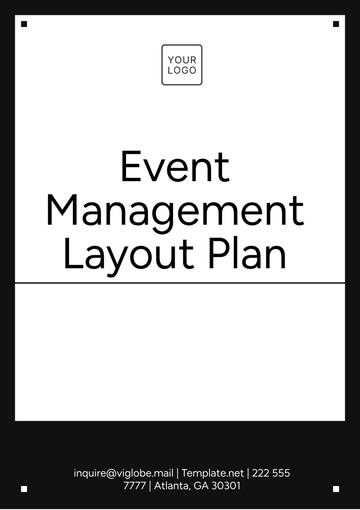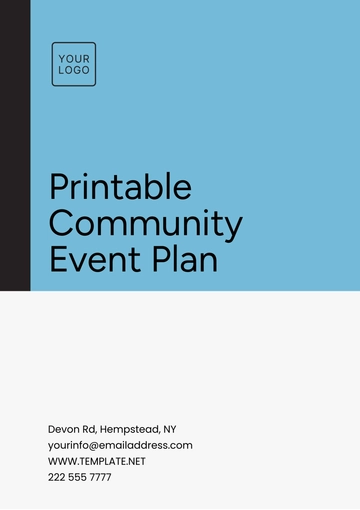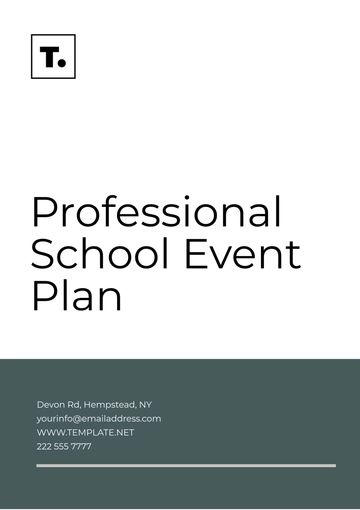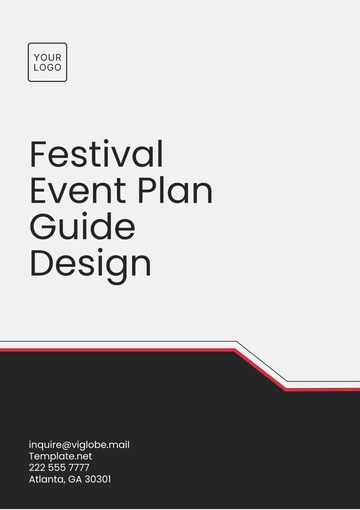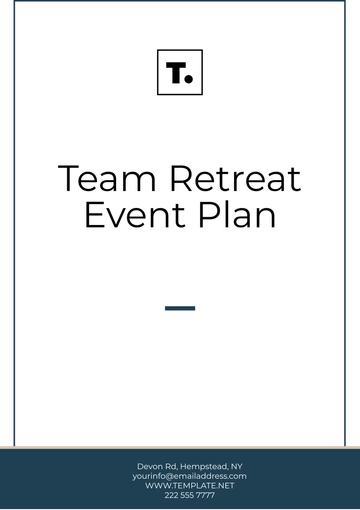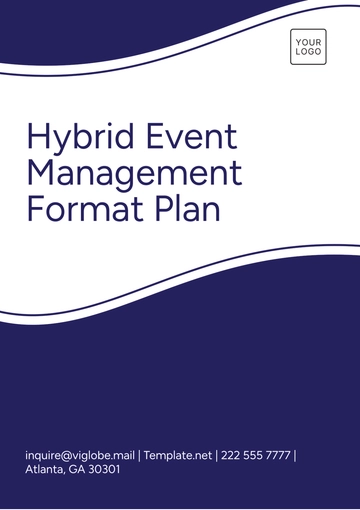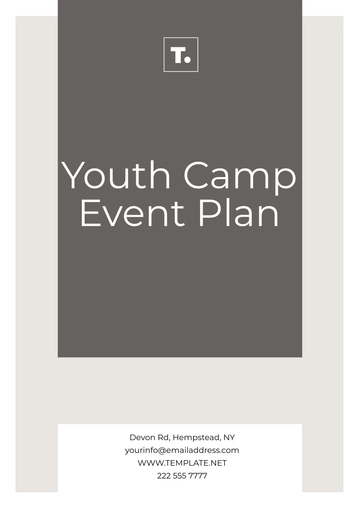Free Small Events Plan

Prepared by: [YOUR NAME] | Company: [YOUR COMPANY NAME]
Introduction
Planning a small event requires meticulous attention to detail and efficient coordination. This guide provides comprehensive instructions to ensure the success of your event, from initial conception to post-event evaluation, supported by reliable references.
Event Concept
The first step is to define the concept and purpose of the event. Consider the following aspects:
Objective: What do you aim to achieve?
Audience: Who are the intended participants?
Theme: What is the central theme or message?
Type: Is it a conference, seminar, celebration, etc.?
Budgeting
Creating a detailed budget is critical. Include estimates for:
Venue costs
Catering
Marketing and promotion
Staff and fees for speakers or performers
Equipment and supplies
For additional budgeting tips, see Jones, M. (2050). The Essential Guide to Event Planning. New York: Event Press.
Venue Selection
Choose a venue that aligns with your event's size, theme, and budget. Consider the following:
Capacity: Ensure it accommodates your expected attendance.
Location: Pick a convenient, accessible location.
Facilities: Check for necessary amenities like AV equipment.
Availability: Ensure the venue is available for your dates.
Refer to: Smith, L. (2051). Top Venues for Small Events. Chicago: Venue Masters. (Available at: https://www.venuemasters.com/top-venues)
Marketing and Promotion
Effective promotion ensures good attendance. Strategies include:
Social Media: Use platforms like Facebook, Twitter, and Instagram.
Email Campaigns: Send invitations and reminders.
Flyers and Posters: Distribute in relevant locations.
Partnerships: Collaborate with influencers or local businesses.
See: Taylor, J. (2051). Marketing Your Event. Los Angeles: EventPro.
Event Logistics
Detail the logistical aspects to ensure smooth execution, including:
Schedule: Prepare a detailed event timeline.
Staffing: Assign roles and responsibilities to team members.
Equipment: Arrange for audiovisual equipment, seating, and other necessities.
Transportation: Plan for attendee and material transport.
Risk Management
Identify potential risks and prepare mitigation strategies:
Health and Safety: Have first aid kits and emergency procedures in place.
Financial Risks: Include a contingency fund in your budget.
Vendor Reliability: Have backup vendors or suppliers.
For more on risk management, see: Brown, P. (2052). Event Risk Management. New York: Risk Press.
Post-Event Evaluation
After the event, evaluate its success and areas for improvement:
Feedback: Collect participant and staff feedback.
Financial Review: Compare actual expenses against the budget.
Report: Create a final event report summarizing outcomes and insights.
Reference: Williams, S. (2052). Evaluating Event Success. London: Event Review Publications.
Conclusion
Proper planning and execution are key to any successful small event. By adhering to these guidelines and utilizing the referenced materials, you can ensure a productive and memorable event.
- 100% Customizable, free editor
- Access 1 Million+ Templates, photo’s & graphics
- Download or share as a template
- Click and replace photos, graphics, text, backgrounds
- Resize, crop, AI write & more
- Access advanced editor
Plan successful events effortlessly with our Small Events Plan Template, exclusively offered by Template.net. This customizable template is editable in our Ai Editor Tool, allowing you to adapt every detail to your specific event needs. Simplify your planning process and ensure a memorable experience with a professionally designed, easy-to-use template.
You may also like
- Finance Plan
- Construction Plan
- Sales Plan
- Development Plan
- Career Plan
- Budget Plan
- HR Plan
- Education Plan
- Transition Plan
- Work Plan
- Training Plan
- Communication Plan
- Operation Plan
- Health And Safety Plan
- Strategy Plan
- Professional Development Plan
- Advertising Plan
- Risk Management Plan
- Restaurant Plan
- School Plan
- Nursing Home Patient Care Plan
- Nursing Care Plan
- Plan Event
- Startup Plan
- Social Media Plan
- Staffing Plan
- Annual Plan
- Content Plan
- Payment Plan
- Implementation Plan
- Hotel Plan
- Workout Plan
- Accounting Plan
- Campaign Plan
- Essay Plan
- 30 60 90 Day Plan
- Research Plan
- Recruitment Plan
- 90 Day Plan
- Quarterly Plan
- Emergency Plan
- 5 Year Plan
- Gym Plan
- Personal Plan
- IT and Software Plan
- Treatment Plan
- Real Estate Plan
- Law Firm Plan
- Healthcare Plan
- Improvement Plan
- Media Plan
- 5 Year Business Plan
- Learning Plan
- Marketing Campaign Plan
- Travel Agency Plan
- Cleaning Services Plan
- Interior Design Plan
- Performance Plan
- PR Plan
- Birth Plan
- Life Plan
- SEO Plan
- Disaster Recovery Plan
- Continuity Plan
- Launch Plan
- Legal Plan
- Behavior Plan
- Performance Improvement Plan
- Salon Plan
- Security Plan
- Security Management Plan
- Employee Development Plan
- Quality Plan
- Service Improvement Plan
- Growth Plan
- Incident Response Plan
- Basketball Plan
- Emergency Action Plan
- Product Launch Plan
- Spa Plan
- Employee Training Plan
- Data Analysis Plan
- Employee Action Plan
- Territory Plan
- Audit Plan
- Classroom Plan
- Activity Plan
- Parenting Plan
- Care Plan
- Project Execution Plan
- Exercise Plan
- Internship Plan
- Software Development Plan
- Continuous Improvement Plan
- Leave Plan
- 90 Day Sales Plan
- Advertising Agency Plan
- Employee Transition Plan
- Smart Action Plan
- Workplace Safety Plan
- Behavior Change Plan
- Contingency Plan
- Continuity of Operations Plan
- Health Plan
- Quality Control Plan
- Self Plan
- Sports Development Plan
- Change Management Plan
- Ecommerce Plan
- Personal Financial Plan
- Process Improvement Plan
- 30-60-90 Day Sales Plan
- Crisis Management Plan
- Engagement Plan
- Execution Plan
- Pandemic Plan
- Quality Assurance Plan
- Service Continuity Plan
- Agile Project Plan
- Fundraising Plan
- Job Transition Plan
- Asset Maintenance Plan
- Maintenance Plan
- Software Test Plan
- Staff Training and Development Plan
- 3 Year Plan
- Brand Activation Plan
- Release Plan
- Resource Plan
- Risk Mitigation Plan
- Teacher Plan
- 30 60 90 Day Plan for New Manager
- Food Safety Plan
- Food Truck Plan
- Hiring Plan
- Quality Management Plan
- Wellness Plan
- Behavior Intervention Plan
- Bonus Plan
- Investment Plan
- Maternity Leave Plan
- Pandemic Response Plan
- Succession Planning
- Coaching Plan
- Configuration Management Plan
- Remote Work Plan
- Self Care Plan
- Teaching Plan
- 100-Day Plan
- HACCP Plan
- Student Plan
- Sustainability Plan
- 30 60 90 Day Plan for Interview
- Access Plan
- Site Specific Safety Plan




